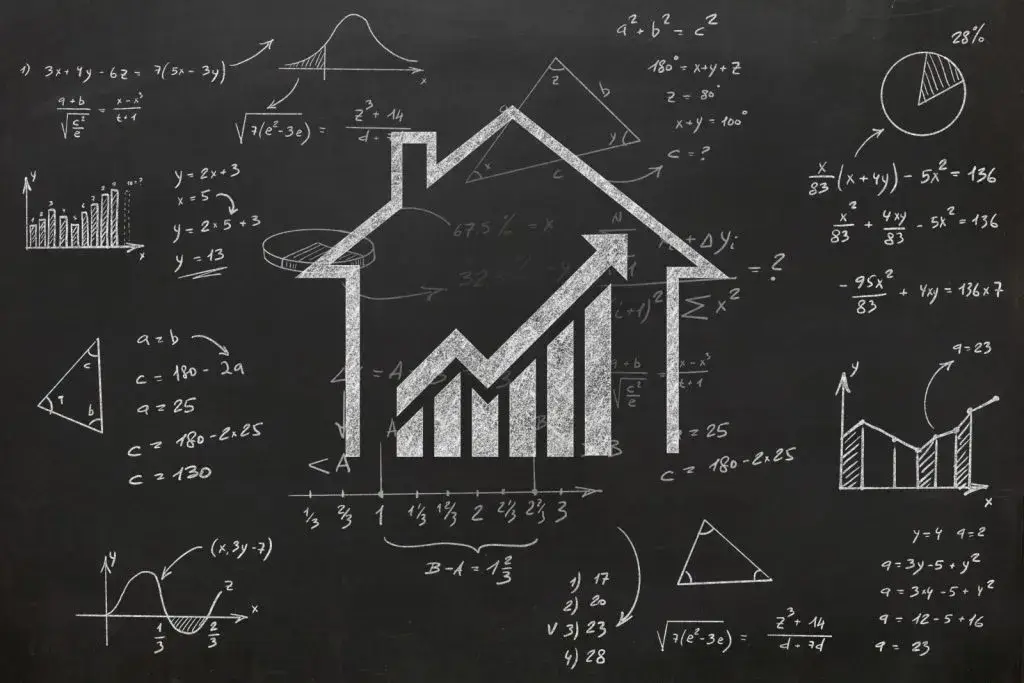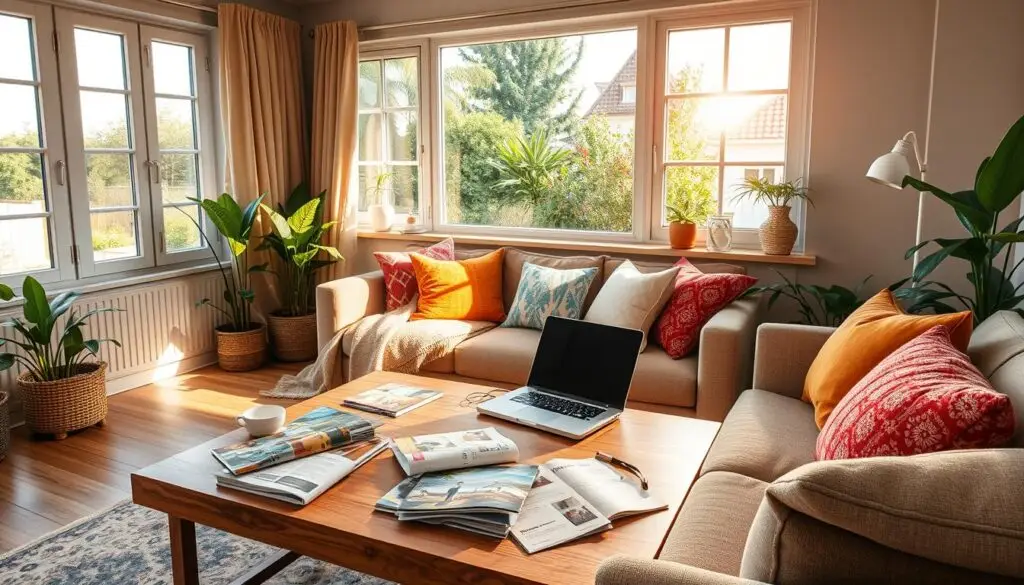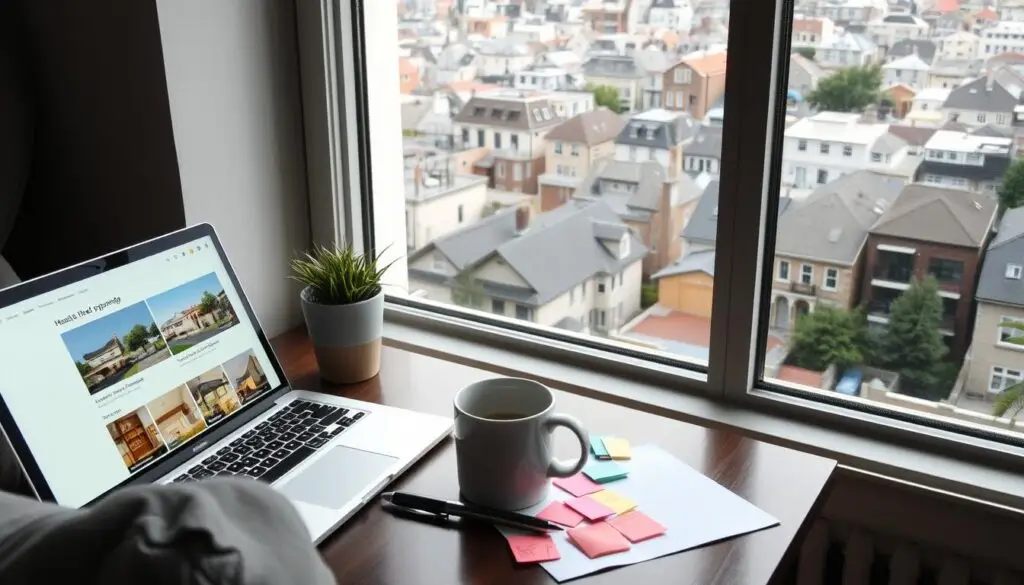Choosing between renting or buying a house is a big financial decision. It affects your lifestyle now and your financial future1. Renting gives you flexibility and saves money, while buying offers stability and can increase your wealth. It’s key to understand both sides before making a choice.
When you decide to rent or buy, you’ll face different costs and benefits. For example, you can get tax breaks on home loans, like deductions up to ₹1.5 lakh on principal repayment under Section 80C1. Also, salaried people can get tax exemptions on House Rent Allowance (HRA), up to 50% of their basic salary in big cities1. Knowing these details helps you choose based on your finances and goals.

Buying a house starts with a big investment, including a down payment, registration fees, and upkeep costs1. It’s wise to pay at least 25% to 30% of the property’s value upfront to lessen loan and interest burdens1. Renting, on the other hand, is more flexible but lacks the pride and satisfaction of owning a home. Remember, the long-term costs of renting versus buying are different, with buying building equity and renting offering no returns1.
Understanding Your Housing Options in Today’s Market
When looking at a home buying guide, it’s key to weigh the pros and cons of renting versus buying. The current real estate market has many apartment lease choices. It’s important to know the main differences between renting and buying.
A home buying guide can help you through the process. But, it’s also vital to think about the financial side of your choice. According to2, the median existing-home sales price has gone up by 4.7 percent. This means you should consider the costs of buying a house. Renting, on the other hand, offers more flexibility and less financial burden, as noted in3 and2.
Here are some key factors to consider when deciding between renting and buying:
- Financial stability: Can you afford the monthly mortgage payments, or is renting a more viable option?
- Lifestyle: Do you prefer the flexibility of renting, or are you looking for a long-term investment in a house?
- Market trends: How will the current market trends impact your decision, and what are the potential risks and benefits of buying or renting?
Ultimately, the choice between renting or buying a house depends on your personal situation and what you value most. By considering these points and getting advice from a trusted home buying guide, you can make a choice that fits your needs and budget.
Financial Preparations Before Making Your Choice
When looking into a rental property search or a buying a home checklist, it’s key to check your finances4. You need to see if you have enough for a down payment, maintenance costs, and how your credit score affects mortgage rates4. It’s also important to figure out how much you can afford to spend on a house4.
Start by saving for emergencies, aiming for 3–6 months of living costs5. It’s also important to tackle high-interest debt to stay financially stable5. When looking at house purchase tips, research the area well. Look at crime rates, school quality, and public transport6.
Here are some key financial preparation points:
- Monthly mortgage payments should not be more than 30% of your income6
- First-time buyers often choose fixed-rate, adjustable-rate, or government-backed loans like FHA6
- Build a portfolio that balances growth and safety based on your risk level and life stage5

The True Costs of Renting or Buying a House
Choosing between renting and buying a house involves looking at the real costs. Buying a home means a big down payment and ongoing maintenance. Renting, on the other hand, doesn’t require a down payment and you don’t have to worry about maintenance4. A mortgage calculator can show you the costs of buying, including loan rates and other expenses.
There are also long-term costs to think about. Renting might mean higher rent and fees for renewing your lease. Buying a home could lead to property taxes and insurance costs. A rent vs buy calculator can help you see how these costs compare over time4. Remember, owning a home might appreciate in value and offer tax benefits like mortgage interest and property tax deductions.
Ultimately, whether to rent or buy depends on your financial situation and what you prefer. By looking at the real costs and using tools like mortgage and rent vs buy calculators, you can make a smart choice7. It’s also wise to compare home loan rates and other expenses to find the best deal8.
Evaluating Your Lifestyle and Future Plans
As a first-time home buyer, it’s key to think about your lifestyle and future plans. Your career goals, family plans, and personal preferences are important. They help decide if buying a home is right for you. Think about your long-term plans and if you might move or change jobs9.
When looking at your lifestyle, think about your daily costs and future money goals. Lenders check your income, debt, and credit score to see how much you can borrow9. But, it’s also important to make a budget that includes extra costs like taxes and maintenance. This helps you figure out if you can afford a home.
Some important things to think about include:
- Stability and flexibility: Do you plan to stay in one place for a long time, or will you move often?
- Family plans: Are you thinking about starting or growing your family, and how will this change your housing needs?
- Personal preferences: What kind of lifestyle do you want, and how will your home choice affect your daily life?
By carefully thinking about your lifestyle and future plans, you can choose wisely between renting or buying a home. Remember to consider all the home buying process factors and the pros and cons of each option9. This way, you can make a choice that fits your goals and dreams.

Understanding Mortgage Options and Requirements
When you’re looking at the US real estate market, knowing your mortgage options is key. There are many choices, like fixed-rate and adjustable-rate loans, government-backed loans, and conventional loans10. For example, conventional loans need a credit score of at least 620 and a down payment of 3 percent10.
Home affordability in the US real estate market depends a lot on the loan type. VA and USDA loans, for example, have easier credit score and down payment rules. This makes them good for some buyers10. Knowing the real estate market trends helps buyers pick the right mortgage. This choice affects how affordable a home is11.
When looking at mortgage options, consider these important factors:
- Credit score requirements, which can change the interest rate and loan terms
- Down payment needs, like the minimum amount and the chance for private mortgage insurance (PMI)
- Loan type, including fixed-rate, adjustable-rate, and government-backed loans
By carefully looking at these factors and understanding the real estate market trends, buyers can make smart choices. This ensures they can afford a home in the US real estate market11.
Essential Steps in the House Hunting Process
Buying your first home can feel overwhelming. But with the right guide, you can make a good choice. A first time home buyer guide will help you research neighborhoods, get pre-approved for a loan, and make an offer12. Knowing about housing market predictions and home buying tips can also guide you to a smart investment.
When you start looking for a house, think about how competitive the market is. This can affect how you negotiate13. You’ll also get a closure disclosure form three days before you close13. Plus, home buying tips suggest comparing lenders two to three months before you start seriously looking13.
Getting pre-approved for a loan is a key step. It helps you know how much you can afford and makes your offer stronger12. Remember, insurance and taxes are part of your monthly payments13. By following these steps and looking at housing market predictions, you can find your dream home and invest wisely.

- Researching neighborhoods and local amenities
- Getting pre-approved for a loan and understanding mortgage options
- Making an offer on a home and negotiating the price
- Conducting home inspections and reviewing strata documents (if applicable)14
By following these steps and using home buying tips, you can confidently navigate the house hunting process. And you’ll make a smart investment in your future.
Navigating the Rental Application Process
When you’re deciding between renting and buying a house, knowing the rental application process is key. It can be complex but being ready helps a lot. As you look for a rental, you’ll see many lease options with different rules.
When applying, you’ll need to provide important documents like proof of income and credit reports15. Landlords usually want your income to be 2.5 to 3 times the rent16. It’s also good to keep your credit utilization under 30% for a better chance16.
Reading the lease agreement carefully is crucial to avoid mistakes15. Some people don’t realize the full cost of renting, including utilities and deposits15. Being well-prepared helps you make a choice that fits your budget and needs.

To stand out as a tenant, show you’re financially stable and have a good rent-to-income ratio16. A polite follow-up a few days after applying can show you’re interested without being too pushy16. Follow these tips to confidently navigate the rental application and find the right lease for you.
Making Smart Investment Decisions in Real Estate
When you think about buying a real estate property, it’s key to look at the return on investment. You need to check the property’s value, cash flow, and how it might grow in the future17. A good home buying guide can offer insights to help you make a wise choice.
When making smart investment choices, think about the property’s value, how much you’ll make back, and if the market will grow18. Also, look into renting houses and how they can bring in passive income.
| Investment Strategy | Potential Return | Risk Level |
|---|---|---|
| Buy-and-Hold Rentals | 8-10% annual return | Medium |
| Flipping Properties | 15-20% annual return | High |
| Short-term Vacation Rentals | 10-15% annual return | Medium |
By carefully looking at these points and thinking about different strategies, you can make a smart choice for real estate or rental properties19.

Legal Considerations for Both Options
When you’re looking into the home buying process in the US real estate market, think about the legal side. You need to consider home affordability and how it impacts your money20.
Buying a home in the US real estate market comes with legal stuff. You’ll deal with property transfer tax, long-term capital gains tax, and step-up basis20. Knowing these can help you decide wisely. Also, think about how home affordability affects your money situation.
Here are some important things to remember:
- Property transfer tax: a fee for changing who owns a property
- Long-term capital gains tax: a tax on selling a property for profit
- Step-up basis: a tax advantage that lets you raise a property’s value for taxes
As you go through the home buying process in the US real estate market, remember these legal points20. They’re key to understanding home affordability. This way, you can choose wisely and have a smooth deal.
Tools and Resources for Decision Making
Choosing between renting and buying a house requires the right tools. A mortgage calculator helps figure out how much you can borrow. It considers your income, expenses, and home loan rates21. Also, a rent vs buy calculator compares renting and buying costs. It looks at rental prices, mortgage payments, and upkeep22.
Other tools include market research reports. They offer insights into current trends and forecasts23. Online resources can also help you compare neighborhoods and understand local real estate.
| Tool | Description |
|---|---|
| Mortgage Calculator | Helps determine how much you can afford to borrow |
| Rent vs Buy Calculator | Compares the costs of renting and buying a house |
| Market Research Reports | Provides information on current market trends and forecasts |
With these tools, you can make a better choice. Whether to rent or buy depends on your finances and lifestyle21.
Important Market Timing Considerations
When deciding to rent or buy a house, housing market predictions are key. Knowing the current real estate market trends helps you make a smart choice. Mortgage rates have been between 6.08% and 7.22% in the last year24. Experts think rates will be around 6% in 202524. Also, the average home value in the U.S. is $357,469, a 2.5% increase from last year25.
It’s vital to think about home buying tips like market timing, interest rates, and the economy. The third web source says market timing is critical, including trends, rates, and economic conditions26. Knowing these can help you choose wisely, fitting your financial goals and risk level.
Some important things to think about when looking at market timing include:
- Current mortgage rates and predictions for future rates
- Home price trends and predictions for future growth
- Economic conditions and their impact on the housing market
By looking at these factors and keeping up withreal estate market trends, you can decide whether to rent or buy a house.
Conclusion: Making Your Final Decision
As you decide whether to rent or buy a house, think about the important points you’ve learned. Mortgage rates might stay between 5.5% to 6.5% by 202527. Some experts even think they could go up to 7.5%27. Home prices are also expected to go up a bit, with Realtor.com saying 3.7% and the NAR predicting 2%27.
The housing market is showing different trends27. NAR thinks existing-home sales will go up by 10% and new home sales by 11%27. But Realtor.com only expects a 1.5% increase in home sales27. The “lock-in effect” is slowly getting better, with Realtor.com saying for-sale inventory will rise by 11.7%27.
Think about the non-financial benefits of owning a home28. You’ll get more involved in your community, feel safer and more private, and can make your home your own28. Buying a home is also a big achievement28.
Choosing to rent or buy a house is a personal decision28. It depends on your money situation, what you like, and your future plans. By carefully looking at the information in this guide, you can make a choice that fits your dreams and helps you have a happy and stable future.
FAQ
What are the key factors to consider when deciding between renting and buying a house?
How can I prepare financially before making a decision between renting and buying a house?
What are the hidden costs of home ownership that I should be aware of?
How do I evaluate my lifestyle and future plans to make the best decision between renting and buying?
What are the different types of home loans available, and what are the requirements for each?
What are the essential steps in the house hunting process when buying a home?
What documentation and requirements are involved in the rental application process?
How can I evaluate the investment potential of a property when considering buying a house?
What are the legal implications of renting versus buying a house?
What tools and resources are available to help me make a decision between renting and buying a house?
How can market timing impact my decision between renting and buying a house?
Source: The Washington Post (Finance) | Related articles: Medium / Quora




